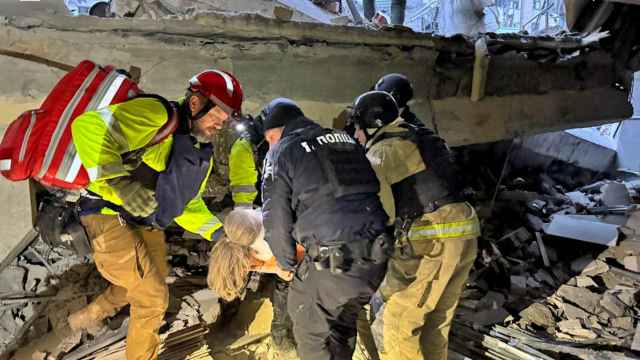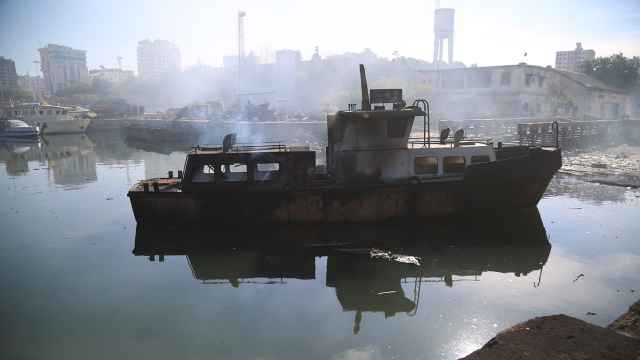An exception to Gazprom's monopoly on gas exports could in theory be made for exports of seaborne liquefied natural gas, Russia's energy minister said Tuesday.
"In theory there are possible options specifically for LNG," Alexander Novak told reporters. "What form to use and what system of agreements with Gazprom Export and others — it would need to be developed specifically."
Gazprom's monopoly is protected by law. But Russia's top non-state gas producer, Novatek, appears to be in the lead in the development of new LNG facilities with its Yamal LNG project, which has France's Total as a 20 percent shareholder.
The Kremlin, concerned about declining markets in Europe, a key source of revenues for Gazprom and therefore for the budget, wants to shift Russia's gas strategy toward LNG, in particular for the growing Asian market.
President Vladimir Putin told Novatek CEO Leonid Mikhelson on Monday, however, that he must work with Gazprom to sell Yamal LNG's output, suggesting he is loath to sacrifice Gazprom's export monopoly to get a much desired LNG strategy off the ground.
"I note that your company, together with Gazprom, or, more precisely, with Gazprom Export, must work on preliminary sale contracts to deliver the product [LNG] to our main partners abroad," Putin told Mikhelson.
"You and I know how this kind of work is done, and investments can be secured only on existing contracts," Putin added in remarks carried by the Kremlin website.
Mikhelson said there was interest in the gas and some tweaks to Russian law were required to obtain project financing.
"The main thing is that we are on schedule," he told Putin, according to the Kremlin transcript.
Putin noted Novatek would need export contracts to secure financing for the project.
Novak did not comment on Putin's remarks, nor did he specify whether the law would require amendments in order for Novatek to ship LNG independently.
Novatek co-owner Gennady Timchenko had told the Russian edition of Forbes magazine that Novatek should be able to go it alone.
Timchenko has built one of the biggest business empires in Russia during Putin's 12-year rule, and the Russian opposition has said his success was due to close ties with the leader, something Timchenko and Putin himself have repeatedly denied.
Putin's comments come as a host of projects compete to liquefy Russian gas, the largest conventional reserves in the world. Putin has told Gazprom to diversify away from its core European market, where demand is falling, and work on an LNG-based strategy to supply the growing markets of Asia.
Merrill Lynch oil and gas analyst Karen Kostanian said Putin's meeting with Mikhelson showed how keen the government was to rapidly diversify Russian gas exports from European pipelines because volumes delivered to Europe and former Soviet satellite states had fallen since 2008.
"While we believe Russia's push for LNG is the only right solution to disappearing demand both domestically and in Europe, it might face increasing competition from upcoming United States, Qatari and Australian LNG capacity," said Kostanian.
Russia's LNG strategy suffered a setback with the effective collapse of talks to save the Shtokman consortium, a Gazprom-led group formed to develop one of the world's largest offshore gas fields. The partners decided it would be too expensive in the current market.
The Kremlin would be loath to see a second LNG project delayed or canceled.
Related articles:
A Message from The Moscow Times:
Dear readers,
We are facing unprecedented challenges. Russia's Prosecutor General's Office has designated The Moscow Times as an "undesirable" organization, criminalizing our work and putting our staff at risk of prosecution. This follows our earlier unjust labeling as a "foreign agent."
These actions are direct attempts to silence independent journalism in Russia. The authorities claim our work "discredits the decisions of the Russian leadership." We see things differently: we strive to provide accurate, unbiased reporting on Russia.
We, the journalists of The Moscow Times, refuse to be silenced. But to continue our work, we need your help.
Your support, no matter how small, makes a world of difference. If you can, please support us monthly starting from just $2. It's quick to set up, and every contribution makes a significant impact.
By supporting The Moscow Times, you're defending open, independent journalism in the face of repression. Thank you for standing with us.
Remind me later.





